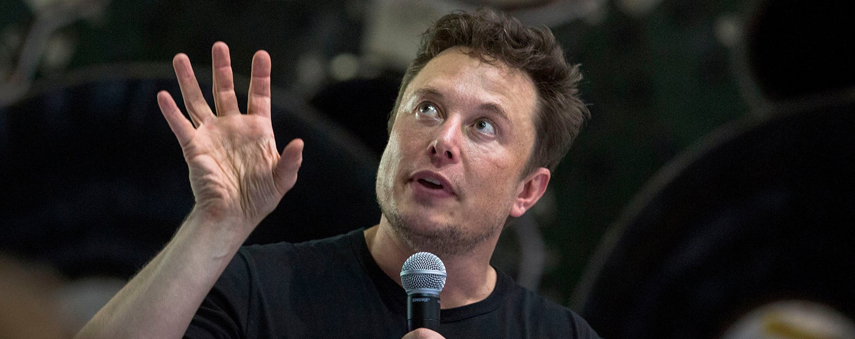Elon Musk’s Neuralink unveils extraordinary “brain-machine” implant

Credit: Business Insider
The entrepreneur’s Neuralink project is an interface made of threads that can effectively read the mind of the user: are we one step closer to becoming cyborgs?
What does it mean to be human? Is it a biological state and are we defined by our organic matter? Or is human a state of mind, defined by our emotion and curiosity, that machines will never be able to match?
It’s a question that becomes more relevant to our species with every technological marvel. It’s now more prevalent as ever, as Elon Musk has announced what his AI startup Neuralink has been working on for the past two years.
“We’re already a cyborg,” says Musk. “You have a digital version of yourself, a partial version of yourself online in the form of your emails, your social media, and all the things that you do.” In this quote, the billionaire was referring to smartphones; Neuralink takes that kind of power to a whole new level, though.
Revealed during a live stream last night, the company has been developing ways for the human brain to communicate directly with a computer. Neuralink has developed a robot that can insert threads under a person’s skull. Three or four sensors can also be implanted into the brain, which connect with a wearable computer, dubbed the Link, which sits behind the user’s ear. The Link then picks up activity from the brain.
The idea is to control your smartphone or keyboard with this device, similar to the Nurio earpiece, which can control IoT devices. Neuralink has also developed an iPhone app that’ll help you control your phone with gestures.
Why is this invention so important to technology?
Elon Musk’s fear of AI is well-documented. Despite founding the likes of Tesla and Neuralink, Musk describes artificial intelligence as “the most serious threat to the survival of the human race”. He’s even gone as far as to refer to the technology as “summoning the demon”.
Neuralink is not a foray over to the dark side for Musk but a weapon for the human race. Neuralink claims its interface enables human and machine intelligence to work in “symbiosis”. Such a chip enables a human being to plug straight into a deeper interface and essentially upgrade their own brain. There’s the potential to communicate with IoT devices, though the initial benefits of Neuralink will be medical.
Musk claims that the Neuralink device has 1,000 times more electrodes working with the brain than the current leading FDA-approved device used for Parkinson’s patients. By developing the technology and working on techniques such as deep brain stimulation, it may be possible in the near future for Neuralink to treat Parkinson’s disease sufferers.

Clinical trials are set for next year – pending Neuralink seeking FDA approval – with the first trials targeted at patients with complete paralysis due to an upper spinal cord. A brain surgeon will be tasked with inserting four of Neuralink’s implants in patients’ brains.
The idea that thoughts could possibly control computers quite so directly is revolutionary enough. This is perhaps the biggest company to have made quite such big strides in this field of neuroscience.
The installation of the Neuralink, too, is extraordinary. Neuralink assumes that the chip can be installed in just a few hours, without a hospital appointment being necessary. Laser beams will be used to pierce holes into the skull: the threads, after all, are just a quarter the width of a human hair and small enough to bypass blood vessels in a brain. This means that there is no chance of causing trauma.
How could Neuralink develop?
With most inventions, the question of how much they can advance society tends to be fairly short-term. Neuralink could potentially be a turning point for our species.
There’s already talk of how two chips could communicate with each other, rather than with an external computer. This would essentially grant people telepathy. “There are a bunch of concepts in your head that your brain has to try to compress into this incredibly low data rate called speech or typing,” Elon Musk once said. Neuralink cuts out this “low data rate” and could allow for consensual communication via thoughts.
Then there’s the potential link-up with other Musk ventures. Tesla is already putting AI onto our roads: it’s likely that Neuralink would be implemented with these autonomous vehicles before other big brands. It’s perhaps a little too advanced or dangerous for the Link to make emergency stops on your brain’s behalf, but being able to control the temperature, music and lock system of your car, just by thinking about it, may well become a reality.
Neuralink is beginning in the medical world and there are countless opportunities for how a brain-machine implant could benefit a person, whether they have a prosthetic limb that needs controlling or a communication device to relay their thoughts to a carer. Expressing pain vocally is a difficult thing to do anyway: a machine that can express it for you is a giant step for healthcare.
The healthcare aspect is certainly reminiscent of the Black Mirror episode, Black Museum. The parallels between dystopian technology and Neuralink are clear, heightened by the invasive installation treatment.
Neuralink may call our humanity into question once more. It’s far-fetched tech. It drags us closer to the side of the machines but at least it does so on our terms.
“I think this is going to be important at a civilization-wide scale,” Musk said at the Neuralink event. “Even under a benign AI, we will be left behind. With a high bandwidth brain-machine interface, we will have the option to go along for the ride.”
